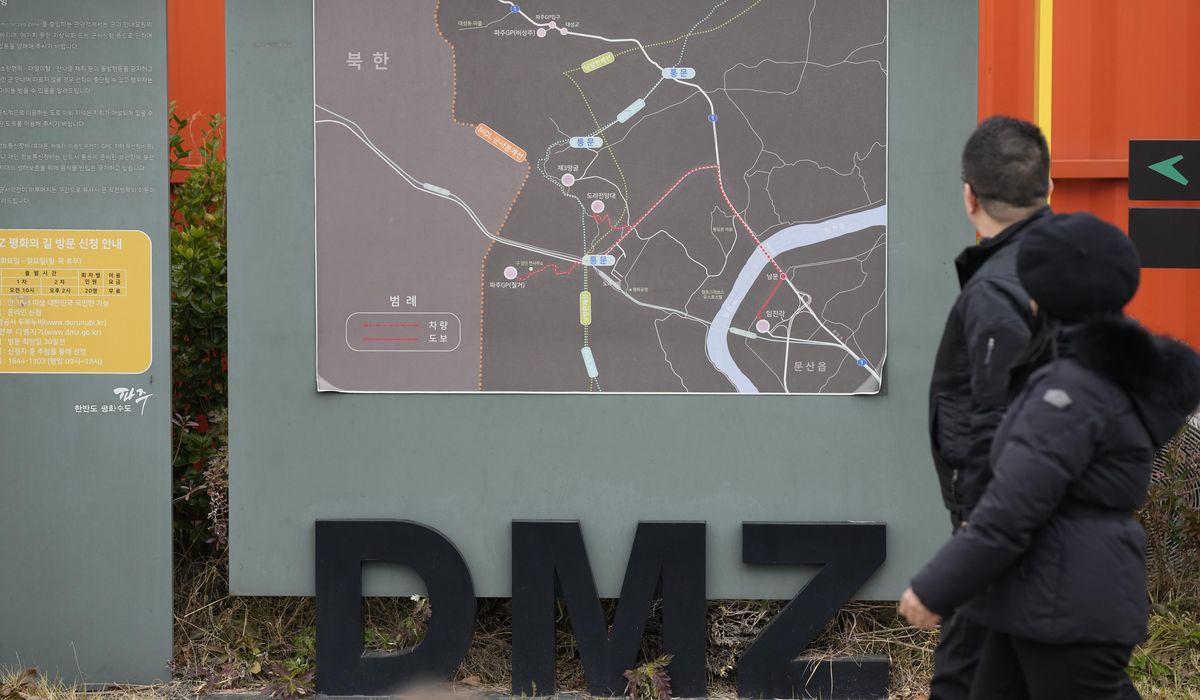


SEOUL, South Korea — Under a gray sky and over the blast of offshore wind, the ear could make out the occasional blare of K-pop lyrics, interspersed with verbal messaging.
The tinny sounds emanated from military loudspeakers set up on the northern rim of Gyodong Island, beyond frozen paddy fields and between the razor-wire fences, watch towers and bases on the Yellow Sea coast.
A few kilometers north could be seen a gray blur: The shores and hills of North Korea. Occasionally, eerie sounds — howls and white noise, like the soundtrack to a horror movie — could be made out through the wind.
Gyodong, an hour’s drive northwest of Seoul, is reached via a barricaded road bridge manned by soldiers.
It is one of multiple locations along the 160-mile-wide DMZ that South Korean civilians can visit to gaze at — and listen into — their mysterious northern neighbor.
On the fence of a lookout platform, beside a fixed telescope, a poignant poem was affixed. “Separated only by a river, yet it seems to be a thousand miles away,” it read. “That is my home, I see it, yet it can’t be reached.”
That was February. Today, with summer approaching Korea, military loudspeakers on Gyodong Island are silent. So are all others across the southern half of the DMZ.
Halting propaganda broadcasts toward North Korea is the first gesture by President Lee Jae-myung, who took office on June 4, to thaw frozen cross-DMZ relations.
“Broadcasts were stopped in all sectors as of the afternoon of June 11,” a military official told South Korean daily the Chosun Ilbo. “This is part of a public pledge to pursue peace on the Korean Peninsula and rebuild trust between the two Koreas.”
Given the policy back-and-forth of different administrations in Seoul and Washington over the last decade, and given his useful new alliance with Russia, it is unclear whether North Korean leader Kim Jong-un will reciprocate.
North and South, back and forth
Mr. Lee’s predecessor, impeached ex-President Yoon Suk Yeol, showed no interest in engaging the North. That led to deteriorating relations and a war of nerves being fought over the DMZ.
In response to balloons carrying anti-regime messaging, sent north over the frontier by activists in the South, the North dispatched balloons filled with trash into the South.
Drones intruded, and banks of loudspeakers opened fire. While K-pop and news reports were a mainstay of the southern broadcasts, North Korea beamed bizarre noises.
“They used very weird sounds to block the loudspeakers from South Korea,” said Jee Hong-ki, a retired South Korean colonel who offers tourist trips to the DMZ. “It had no meaning; it was only noise, like a jet engine, that gave civilians [in the border area] headaches at night.”
Mr. Yoon’s stance, in turn, contrasted with the approach of his predecessor, President Moon Jae-in, who summited with North Korean leader Kim and oversaw a military de-confliction agreement in and over the DMZ.
Mr. Moon’s 2017-2022 term overlapped with the first term of U.S. President Trump. After Seoul laid diplomatic groundwork, Mr. Trump became the first U.S. leader ever to meet a sitting North Korean leader, at a summit in Singapore in 2018.
Hopes of a new era soon evaporated. After a second North Korea-U.S. summit in Hanoi, Vietnam, failed in 2019, Pyongyang-Washington relations deteriorated.
Inevitably, so, too, did Pyongyang-Seoul relations.
But while Mr. Lee — and perhaps Mr. Trump — may want to reset relations with Mr. Kim, whether Mr. Kim is interested is a different question.
“Turning off the speakers is a signal from the new government that they want to take a different approach from the previous government, but I don’t know if North Korea will reciprocate,” said Shin Hee-seok, a legal advisor to NGO Transitional Justice Working Group, which monitors human rights violations, with a special focus on North Korea. “The geopolitical situation has changed so much.”
Seeds of discontent
The collapse of the USSR four decades ago made North Korea more reliant than ever on China — fueling a sense of resentment, some analysts say, among North Korea’s leaders.
It is widely believed that Mr. Kim’s 2013 execution of his uncle, Jang Song-thaek, was due to the latter’s close ties with China.
But the Ukraine war has reshaped the geopolitical landscape.
Since Mr. Kim and similarly isolated Russian President Vladimir Putin signed a Comprehensive Strategic Partnership in 2024, North Korea’s need for friends abroad has lessened.
In return for massive supplies of munitions and a division-sized troop deployment of crack North Korean troops to help defeat a Ukrainian offensive into Kursk oblast, the Kremlin has reciprocated.
Moscow has offered Pyongyang diplomatic cover at the U.N. Security Council, and is believed to be offering miltech support, though details are shady.
Ukrainian sources say North Korean tactical ballistic missiles have attained increased accuracy, possibly due to Russian guidance technologies.
Russia-style air-defense systems have been spotted on new North Korean destroyers, and there are early indications that Moscow is sharing Iran-originated drone technologies with Pyongyang.
Facing loss of influence, Beijing needs to compete with Moscow to retain leverage in Pyongyang, Mr. Shin guessed.
A less-isolated North Korea diminishes the appeal of a thaw in relations with Seoul and Washington.
“My personal view is that North Korea is in a very different place than it was 10 years ago and there are not that many incentives to really engage the U.S., let alone South Korea,” said Mr. Shin. “We will see.”
“Loudspeakers have some importance, so it is a good signal that the South has this policy,” said Mr. Jee. “But if we turn off, will they turn off? The key to everything is Kim Jong-un.”
• Andrew Salmon can be reached at asalmon@washingtontimes.com.
